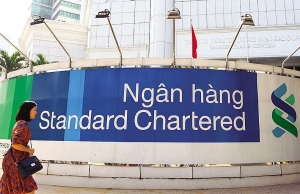Profound shift being felt in nation’s wealth management
Following its inaugural event last year, the Vietnam Wealth Advisor Summit 2024 – a forum organised by Vietnam Investment Review and the Vietnam Wealth Advisor community under the auspices of the Ministry of Planning and Investment – will be held on June 6 in Hanoi.
 |
| Profound shift being felt in nation’s wealth management, |
Under the theme “Adapting to Uncertainties,” the event will feature domestic and international speakers who will delve into global economic scenarios and their specific implications for Vietnam. The discussions will cover investment opportunities, optimal asset allocation for efficient portfolio management, detailed insights into stock portfolios, and global asset management.
The forum this year occurs against a backdrop of global economic fluctuations, rising geopolitical risks, persistent inflation, and significant polarisation in monetary policy. Given these dynamics, experts said that it is crucial to identify the key variables impacting the economy to develop a proactive and flexible investment strategy.
For each economic scenario, constructing a well-balanced and sustainable investment portfolio, with carefully selected products from reputable sources, will be essential to achieving efficiency, managing risks, and meeting the preferences of Vietnamese investors.
According to financial and banking expert Le Xuan Nghia, wealth management should be used from an early stage, first by saving, followed by accumulating and then investing.
“Although the rate of people using wealth management services is low, the market potential is huge because Vietnamese individual investors tend to like investing and have a high tolerance to risk taking,” Nghia said.
“With a population of 100 million people and the Vietnamese people’s high risk-taking investment tendency, if we build a financial market and a methodical wealth management market, I believe that within 10 years, Vietnam’s asset management market size can be the top in Southeast Asia,” he added.
| Under the theme “Adapting to Uncertainties,” the Vietnam Wealth Advisor Summit 2024 (VWAS 2024) will feature Ministry of Planning and Investment leaders, domestic and international speakers who will delve into global economic scenarios and their specific implications for Vietnam, discuss investment opportunities, optimal asset allocation for efficient portfolio management, detailed insights into stock portfolios, and global asset management. VWAS 2024 will include two discussion panels on the macroeconomic scenario as well as investment asset management and stock portfolios. The agenda will also encompass a recognition ceremony to honour Excellent Financial Products and Services 2024. Time and location: 13h -18h30; Pullman Hotel Hanoi - 40 Cat Linh, Hanoi Livestream: baodautu.vn, tinnhanhchungkhoan.vn, https://www.youtube.com/c/TaichinhkinhdoanhTV |
A pivotal shift
According to the latest calculations, the global asset management market was valued at over $376 billion in 2022 and is projected to grow robustly with a compound annual growth rate of 9.85 per cent until 2028.
For years, the wealth management market has primarily served the upper class in developed countries. However, financial instability and sluggish growth in these major economies have triggered a pivotal shift. Western Europe, once the epicentre of the global asset management industry, is facing prolonged difficulties, and North America has not yet regained its pre-pandemic growth momentum.
According to the International Monetary Fund, the GDP growth rate of developed regions, including Western Europe and North America, is only at 1.7 per cent this year, significantly lower than the 4.2 per cent growth rate of emerging markets and the global GDP growth rate of 3.2 per cent. This scenario has catalysed a major transformation in the wealth management market, with capital increasingly flowing to emerging markets, particularly in Asia and Southeast Asia.
The projected rise in the share of millionaires among the adult population by 2030 further underscores this trend. The World Economic Forum 2024 forecasts Southeast Asia as one of the fastest-growing regions globally, with average real GDP growth expected to have reached 4.6 per cent in 2023 and will hit 4.8 per cent in 2024. By 2030, Southeast Asia is anticipated to be the world’s fourth-largest economy.
Emerging economies like Vietnam, Indonesia, the Philippines, and Thailand are drawing global asset managers’ attention due to their impressive economic growth and the burgeoning potential of their middle and upper classes. The rapid expansion of the wealthy and high-net-worth individuals (HNWI) has transformed this region into a goldmine of potential clients, heralding a new era for wealth management.
Vietnam’s personal wealth growth is outpacing other countries in Asia. According to the World Economic League Table 2022 report by the Centre for Economic and Business Research, Vietnam will become the second-largest economy in Southeast Asia by 2036. This growth is fuelled by regulatory reforms, a skilled workforce, and the rise of the ultra-HNWI, which collectively create a conducive environment for establishing a leading wealth management system in the region.
Despite these prospects, Vietnam’s current market size remains modest. According to a McKinsey & Company report published in September 2023, Vietnam’s personal financial advisory market is expected to grow from approximately $360 billion at the end of 2022 to about $600 billion by 2027, with an annual growth rate of 11 per cent. The total personal financial assets under management in Vietnam were between $45-52 billion in 2022, generating around $500 million in asset management revenue.
The proportion of assets under management (AUM) relative to total personal financial assets is projected to increase, especially within the high-income customer segment, where AUM is expected to grow 5.5 times by 2027.
Similarly, the HNWI segment is anticipated to see its AUM double by 2027. This presents a golden opportunity for asset management companies to capitalise on untapped assets by attracting wealthy clients and shifting idle cash from deposits to investment and insurance solutions, McKinsey noted.
Appropriate frameworks
However, it added, the path to realising this potential is not without challenges. The most enduring obstacle is the shortage of talent, particularly in financial advisory skills and market knowledge. Additionally, despite high smartphone penetration, Vietnam’s digital infrastructure is still developing and is not yet fully equipped to support comprehensive digital wealth management services.
Companies that can innovate and adapt are likely to seize the greater opportunities. Investing in technology and enhancing the skills of their workforce will be crucial for financial institutions aiming to tap into this vast market potential. McKinsey suggested that overcoming these current challenges will enable banks, insurance companies, securities firms, and fintech companies related to asset management to prioritise and develop the wealth management sector, thus unlocking significant market potential.
Writing for VIR last month, finance lecturers Dr. Devmali Perera and Dr. Le Hong Hanh from RMIT University Vietnam explained that the nation’s wealth management sector stands at a pivotal point.
“At present, the Vietnamese market still lags behind appropriate wealth management frameworks similar to what they have in developed markets like Singapore and Hong Kong,” they wrote. “Many wealth management services in Vietnam are currently limited to stock market investments and have not expanded to cover all investment channels like in other countries, including real estate, deposits, and foreign currencies.”
To determine what conditions are needed for the wealth management sector in Vietnam to develop further, Perera and Hanh advised Vietnam to examine the wealth management sectors in Singapore and Hong Kong to draw some lessons.
| Ngo Thanh Huan, CEO FIDT Wealth Management
In a challenging business circumstance as currently, accessing the capital market will be more difficult than usual. What businesses need to prepare for is good asset quality. Statistics have indicated that each economic cycle usually lasts for about 10 years, in which rebounds extend about one year, followed by a growth period of 3-5 years. For 2024, many experts believe that the economy is recovering, as can be seen in low interest rates. Just a month ago, interest rates were at their lowest in the past 30 years to stimulate the economy. That contrasts with the first half of 2023 when the interest rates were high, yet credit growth was at its bottom in the past decade. In addition, the index of industrial production picked up again and overall GDP grew, confirming the initial absorption of capital flows into business activities and the recovery of purchasing power. Stocks have also been the best growth channel in the past two years, which delivers the message that the economy has passed its most difficult period. In the long term, among asset classes, stocks are the channel eying the most growth. In a developing country like Vietnam, the middle class is the most developed one, estimated at 22 million people and is expected to reach 50 million in the next five years. At this rate, real estate growth will recede, providing a potential opportunity for investors to allocate assets. Nguyen Ba Huy, Portfolio manager SSI Asset Management
Vietnam is recovering from low development levels in 2023 but rebound momentum could continue into 2025. The State Bank of Vietnam (SBV) has cut its policy interest rates early to ease the burden of borrowing costs for consumers and businesses and fuel economic growth. Recent macroeconomic signals have clearly shown a recovery momentum, with a strong recovery in import-export activities and industrial production. For instance, total import-export value is expected to touch $305.5 billion in the first five months of this year, showing a 16.6 per cent jump on-year. In terms of sustainable investment strategy, it is important to have a long-term vision. If investors can invest in the market in the long term, then investing in the stock market of a high-growth economy like Vietnam is ideal. In respect to specific portfolio allocation between channels such as real estate, bonds, stocks, or gold, there doesn’t exist a fixed formula as it depends on each person’s asset base, investment goals, and risk tolerance. Individual investors should note that venturing into gold and USD carries many risks as developments depend on various factors such as US inflation, geopolitical tensions, and macroeconomic policies. In Vietnam, speculative psychology appears while supply is scarce. The government and the SBV have made moves to intervene in the gold market, such as holding auctions of SJC-branded gold bars. The real estate market is forecast to warm up later this year and beyond as new rules are introduced, large housing demand continues, and infrastructure is improved. |
 | Banks take on wealth management Managing the wealth of well-off people could be a pleasantly profitable business for banks this year, as the number of the rich is growing alongside the strong performance of the local economy. The development of this segment depends on legal backup from the central bank, banks’ competency and capability, and further market expansion. |
 | Developing a wealth management answer for affluent clients Vietnam has been among the top 10 fastest-growing economies in the world over the last 30 years, and the country will continue to be one of the fastest in the next two decades. As such, the wealthy population is rapidly growing too. |
 | Lessons in wealth management and suitable directions for Vietnam Vietnam boasts great potential in financial service development. Finance lecturers Dr. Devmali Perera and Dr. Le Hong Hanh from RMIT University Vietnam touch on what the country can learn from the successful lessons of dynamic hubs in the region such as Singapore and Hong Kong. |
What the stars mean:
★ Poor ★ ★ Promising ★★★ Good ★★★★ Very good ★★★★★ Exceptional
Related Contents
Latest News
More News
- Private capital funds as cornerstone of IFC plans (February 20, 2026 | 14:38)
- Priorities for building credibility and momentum within Vietnamese IFCs (February 20, 2026 | 14:29)
- How Hong Kong can bridge critical financial centre gaps (February 20, 2026 | 14:22)
- All global experiences useful for Vietnam’s international financial hub (February 20, 2026 | 14:16)
- Raised ties reaffirm strategic trust (February 20, 2026 | 14:06)
- Sustained growth can translate into income gains (February 19, 2026 | 18:55)
- The vision to maintain a stable monetary policy (February 19, 2026 | 08:50)
- Banking sector faces data governance hurdles in AI transition (February 19, 2026 | 08:00)
- AI leading to shift in banking roles (February 18, 2026 | 19:54)
- Digital banking enters season of transformation (February 16, 2026 | 09:00)



 Tag:
Tag:


















 Mobile Version
Mobile Version